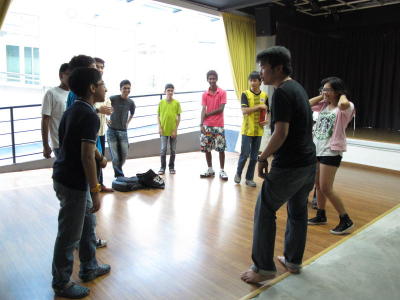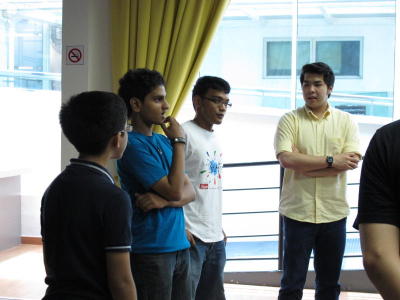The BRATs got a crash course in comedy last weekend from popular local comedians Kuah Jenhan and Phoon Chi Ho.
By V. VISHNU and SATHESH RAJ
A day without laughter is a day not worth living, said the great Charlie Chaplin. and that’s one of the main inspirations behind the Mini Ha Ha workshop series, a free programme to teach children about comedy.
For every Saturday in the month of May, Mini Ha Ha will teach young people aged 12 to 18 how to see the funny side of things, and also how to make people laugh.
The workshop is being held in conjunction with the month-long PJ Laugh Fest 2012, a comedy festival at the PJ Live Arts centre in Petaling Jaya, Selangor featuring performances from some of Malaysia’s most famous – and infamous – comedians, such as Harith Iskander, Douglas Lim, Adibah Noor, Papi Zak, Andrew Netto, Kuah Jenhan and Phoon Chi Ho.
When the BRATs attended last Saturday’s Mini Ha Ha session at the PJ Live Arts centre, Jenhan and Chi Ho were running the workshop, and they led participants in a variety of Whose Line Is It Anyway-style exercises designed to help them think on their feet.
One of the exercises, for example, which they called the “Three-headed game”, had participants taking turns to perform on stage in groups of three. Phoon and Kuah would give each group a story/scenario, and they would have to tell that story, but with each person taking turns to say just one word to form a sentence.
But the exercises weren’t just about being funny. The young participants were also learning to be more comfortable speaking in front of a crowd, and were being encouraged to move out of their comfort zones.
During an interview after the workshop, we got Kuah and Phoon to stay serious for about five seconds to tell us what they thought about the aspiring comedians they met at Mini Ha Ha, and also what it takes to be a comedian.
“They were very reserved at first,” said Phoon of the young participants. “But after the games, they started to break out of their shells, and I think everyone needs that push to just go out and do it, especially young people – no matter how ugly you think you are, how stupid you think your jokes sounds. That’s the basis of comedy! You must be able to laugh at yourself first.”
Kuah added that many of the participants had actually prepared little routines and impersonations that they wanted to try out, but none of them dared to before the exercises.
“Some of their impersonations were really spot-on!” said Kuah. “I was very impressed with their material, but they were all worried that it wouldn’t be funny, that they wouldn’t be able to perform it well. Only towards the end of the workshop, they were asking: ‘Can we show you this? Can we perform something for you?’”
For Phoon, it was a reminder of how he got involved in comedy himself, as an aspiring actor who was pushed by a mentor to try performing stand-up.
“In Malaysia, the schools don’t have any show-and-tell, so the ability for young people to just go out there and be themselves, to perform or just do something, is not there.
“You aren’t given the opportunity, so you have to go out and grab it yourself. What Mini Ha Ha has proven is that everyone has something to offer in terms of humour, they just need the opportunity,” he said.
For all the budding comedians out there hoping to grab the next opportunity that comes your way to perform, Phoon and Kuah have a few tips to help you prepare.
For starters, always have a pen and notepad with you.
“Even if you are at a coffee shop, something funny can happen. Or you could suddenly think of something funny – just write it down so you don’t forget,” said Kuah.
Secondly, always come up with jokes based on real stuff. Never make things up.
“Comedy works because it’s relatable, so it has to be true,” added Kuah. “If you’re school kid, don’t start a joke with: ‘My wife and I …’ Nobody will believe you! The premise has to be true, and from there you can explore different angles that might be funny.”
Lastly, perform. There’s no other way to learn how to become a comedian apart from performing at open mic events.
Phoon explains: “In terms of stand-up comedy, all you have are open mics. If you’re a model, you can practise poses in front of a mirror. But with stand-up, you can’t practice with your parents, or your girlfriend.
“You can’t practice by yourself – you have to just do it, whether it’s for 50 or 300 people; and the more you do it, the better you’ll be.”
The BRATs are graduates from The Star’s young journalist programme, and they write something for us every week. Got a story idea for them? Email us at alltherage@thestar.com.my




Tell us what you think!